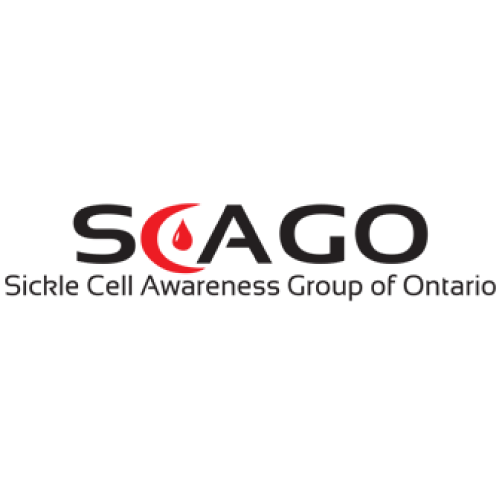Sickle Cell Awareness Group of Ontario

Sickle Cell Awareness Group of Ontario
Sickle cell disease is a group of inherited red blood cell disorders that affect the hemoglobin, a protein that carries oxygen in the red blood cells. Healthy red blood cells are round and squish to move through small blood vessels to carry oxygen to all parts of the body. In a person with sickle cell disease, the hemoglobin is abnormal, making red blood cells hard so that they get stuck in smaller blood vessels, clogging blood flow, and giving them a curved, sickle-like appearance. The sickle-shaped cells die early, which causes a constant shortage of red blood cells throughout the body.
For people with sickle cell disease, symptoms start to appear when they are about five months old. Symptoms can range from mild to severe, and they are different for each person. Common complications of sickle cell disease include anemia, acute chest syndrome—a life-threatening condition—blood clots, kidney and liver problems, organ damage, frequent infections, vision loss, and even stroke.
Sickle cell disease is the most common inherited disease in Canada and one of the most common inherited diseases in the world. While there is no cure, there are treatments available that can prevent complications and lengthen the lives of people with sickle cell disease. However, because sickle cell disease most commonly affects Black people, research into finding a cure and more effective treatments has historically received less funding than other, less common conditions.
Sickle cell disease mostly affects people whose ancestors came from sub-Saharan Africa, South America, the Caribbean, Central America, Saudi Arabia, India, and the Mediterranean. However, anyone who inherits two copies of the gene that causes sickle cell disease – one from each parent – will be born with sickle cell disease. People who inherit just one gene do not develop sickle cell disease. Instead, they “carry” the sickle cell trait. A person with the sickle cell trait has an increased chance of having a child with sickle cell disease if they have a child with another person also who carries the sickle cell gene.
About 3,500 people in Ontario have sickle cell disease but it’s estimated that more than 150,000 Ontarians carry the sickle cell trait. Although Ontario now offers universal newborn screening for sickle cell disease, critical gaps remain in our understanding and knowledge about the exact prevalence of sickle cell disease in our province.
You have to prepare yourself to have a bad day.
Click to see video transcript
Lanre:
The Sickle Cell Awareness Group of Ontario is a leading patient organization that’s dedicated to supporting patients and families affected by sickle cell disease. We support advocacy with the government, schools, workplace, healthcare system. We provide care providers and patient disease management education programs. We support health promotion, community awareness. We also help to provide scholarship for the young students who have sickle cell disease and in dire financial situations. So, in a nutshell, the Sickle Cell Awareness Group of Ontario is a support and advocacy organization for families affected by sickle cell disease.
As a small organization, the Sickle Cell Awareness Group of Ontario is currently 100% volunteer run. While that is good in principle, volunteers also have day jobs. And so it makes it very difficult for us to do many of the programs that are essential to supporting the families with sickle cell disease.
By being part of the Federated Health Charities and receiving donations we’ll be able to hire, even if it’s one or two staff members, to support our programs. We will be able to also put in place additional programs to support these families that do need us. They dearly need programs and support. And if we receive donations, we will be able to move forward with many of those programs that will improve the care that they do receive in order to ensure they have improved quality of life.
Lynella:
I didn’t find out. My parents did. I was three years old, living in South America, Guyana, and they find me being a colicky child so they explore avenues with what might be wrong. And I was tested positive for sickle cells anemia it was called back then. Now it’s called sickle cells disease. So they received the bad news. I was a child so I didn’t really feel the impact of it as a child, not knowing what it was then.
But in my adolescent years of life I’ve come to understand what it was, how it impact me, how it made me feel. So, being shunned out from a lot of things that normal kids would have done, it has made an impact that way in keeping me restricted to limited things that I could physically accomplished during an adolescent time in your life as a teenager.
This disease affects my life in many different ways. Having to spend most times in the ER in a hospital, long weeks, months, doctor visits, having a social life, keeping a steady job, being part of school system. It affects in every physical ability I do have, you know, sports and hanging out. You have to prepare yourself to have a bad day and start with a good day and end with a bad day. You have to just roll with, just cope, like coping with the disease.
Without the help of a charity, I would probably be just wondering if I was the only one still. You know, going in and out of life without the support, going in and out of crisis without someone to relate to, not having the education to follow up with the disease, not having the advocacy of a charity to help voice the concerns of the disease. So, it’s given me the support to come out and say, hey, my name is Lynella Welcome. I have sickle cells disease and I cannot do X, Y and Z, things that you could do. I have limitations to my physical self and what I accomplish in a day and how much of it I can do in one day.
Lanre:
So the Federated Health Charities are supporting the organization to get donations from the Ontario Public Services, the OPS. And these donations are helping to ensure that our programs continue to run and that we continue to support the families that dearly, dearly need our support. So, we’re very happy that sickle cell disease is getting donations through the Federated Health Charities to ensure that we continue to move forward in our mission. And our mission is simply to improve the lives of individuals living with sickle cell disease.
[End of recorded material 00:05:04]
“Most days I am on edge, preparing for a phone call from her school secretary telling me that she is having a crisis and that I need to come get her, or that they had to administer pain medication to her. This happens on average three to four times per week,” says MaryAnn. “The reality of this can be overwhelming and isolating, especially as a single mother.”
For MaryAnn, the support SCAGO provides to families and caregivers of people with sickle cell disease was critical.
“I immediately bonded with other parents who are going through the same things I am. SCAGO provides a safe, non-judgmental environment for [sickle cell disease] patients and their caregivers. This shared experience gives parents like me the emotional strength to continue to provide the best possible care for our children who suffer from this debilitating disease.”
Federated Health Charities has been a supporter of the Sickle Cell Awareness Group of Ontario (SCAGO) since 2020.
“As a small organization, the Sickle Cell Awareness Group of Ontario is currently 100% volunteer-run. While that is good in principle, volunteers also have day jobs. And so it makes it very difficult for us to do many of the programs that are essential to supporting the families with sickle cell disease,” says Lanre Tunji-Ajayi, SCAGO President and CEO.
“By being part of the Federated Health Charities and receiving donations we’ll be able to hire, even if it’s one or two staff members, to support our programs. We will be able to also put in place additional programs to support these families that do need us,” Lanre says. ” So, we’re very happy that sickle cell disease is getting donations through the Federated Health Charities to ensure that we continue to move forward in our mission. And our mission is simply to improve the lives of individuals living with sickle cell disease.”
Learn more about Sickle Cell Awareness Group of Ontario at Sickle Cell Awareness Group of Ontario (sicklecellanemia.ca).
Donate to Federated Health Charities today to support a healthier Ontario and a better life for people and families living with sickle cell disease.
Click on the button below to make a donation to Sickle Cell Awareness Group of Ontario through Federated Health Charities




For general questions:
647-278-9861
federated.health.charities
@ontario.ca
Address
315 Front St. West, 5th Floor
Toronto, ON
M7A 0B8
Follow us

For general questions:
647-278-9861
federated.health.charities@ontario.ca
Address
315 Front St. West, 5th Floor
Toronto, ON
M7A 0B8
Follow us
© 2025 | Federated Health Charities. All rights reserved. Privacy policy. Designed by Cristhian Arevalo Leon.

